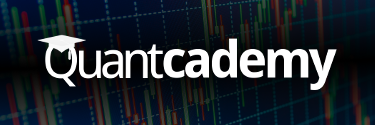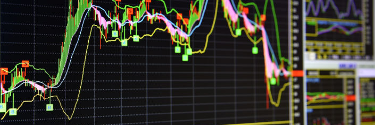Quantitative trading has grown to become a significant industry in the last ten years. The availability of data, sophistication of tools and speed of computation has opened up the market not only to more nimbler startup quant funds, but also to the retail algo trader. This trend has created large numbers of global quant analyst, software engineer and quantitative trading roles. It is only likely to continue as more markets emerge and new tradeable instruments are brought out.
However, a financial crisis in the Western hemisphere coupled with other macro/socioeconomic factors has lead to a reduction in scientific and engineering budgets and later-stage investment in such technologies. This is particularly apparent in academia, where grant funding is becoming harder to obtain and a healthy work-life balance is becoming trickier to achieve. Out of this comes a growing disillusionment of pure research as a long-term career. Consequently many highly talented individuals are leaving academia at all levels and causing a significant increase in supply to these aforementioned financial roles.
The rise of the Masters in Financial Engineering (MFE) postgraduate course has further added to the quantity of talented individuals who are now after technical financial roles. For these two reasons there is now a substantial group of candidates who are well-qualified for many of these jobs, all competing in a global marketplace. Unfortunately, this has had the effect of creating intense competition for the top financial posts, particularly in the area of quantitative trading.
Thus, in 2013, there is currently a distinct supply/demand imbalance for quantitative finance careers. While this may seem like a hopeless situation for those on a job hunt, I would argue instead that interview success just requires a different approach. In this article I will outline how I would go about applying for a role in a quantitative fund, were I applying today. Despite the intense competition, it is still possible to shine as a candidate, but you must be very well aware of what the funds are after, and then make sure you are providing it to them.
What are the top quant funds looking for?
The first thing to consider is that as with anything else in life that is subject to a ranking system there are "Tier 1" and "Tier 2" funds, as well as many lesser funds. The top tier firms are only seeking the absolute best candidates, who possess the strongest technical skillsets. For example, they will often only take individuals who have a PhD, with a strong publication record in Mathematics, Physics or Computer Science and who can "bring something to the table" that they currently don't possess.
This could mean a particularly strong knowledge of a specialist machine learning or signals analysis technique, deep experience of high-performance C++, Linux kernal tuning or network hardware latency optimisation or specialist portfolio construction methodologies. They are also particularly interested in candidates who have demonstrated a successful quantitative trading track record in the past (more on that below).
Funds are currently finding it extremely hard to fill roles of this magnitude, but their success and resources give them time to hunt for the best individuals. Thus you should only consider applying to the top firms if you feel that your area of research or computational skills are exceptional and that you can apply them to the financial domain in a short space of time.
This could mean that if you're currently a 'reasonably good' expert in a particular area of relevance to a quant fund, then it is almost certainly worth "going the extra mile" and becoming THE expert on the topic. A good publication record, open source software development/contribution and consulting in the area will all be great points to add to a CV.
You should also bear in mind that funds rarely allow people to manage a "book" (i.e. get allocated trading funds) on day #1. They will want to see how you perform at the core skills of software development, team interaction, trading idea generation and research methodology before letting you loose on the firms capital. Thus when applying for roles at quant funds, you should be thinking about the next step ahead and where you want to end up, as it is highly unlikely that you will be trading on the first day.
The exceptions to this are where you already have a strong prior trading track record and can apply your strategy to the capital of the firm.
General quant hedge funds
Fortunately, there are a substantial number of less well-known hedge funds who are in desperate need of talent and don't have the time or resources to wait for the Isaac Newtons of this world to apply! These smaller shops, while still in need of high quality talent, are somewhat more forgiving if you didn't attend ten Mathematics Olympiads when you were in school.
A great way to get into such a fund is to apply as a software developer, with aspirations of becoming a portfolio manager. Not only will you be "closer to the money" in a smaller firm, but it is likely that you will find mentorship more straightforward. Such mentorship is highly valuable for a quant trading career. A good mentor can make the difference between running a successful trading book for the long-term or the short path to closing your brokerage account!
Highly trained, experienced software engineers working on high-performance mission-critical systems are also hard to find. Thus if you have a background in embedded systems design, scientific big data analysis, high-performance computing or a similar field, then you are likely to be highly valued by quantitative investment funds.
Bear in mind that in quant trading skill requirements can often be extremely specific, so it may take some time to find the exact role. However, if a firm sees a need for exactly the skills you are offering, it will likely be a rapid interview process, with minimal "HR fuss" that can often accompany job applications at larger firms.
MFE graduates - Are quant funds interested?
The number of MFE courses exploded in the quantitative "boom" period of 2003-2007 when derivatives pricing was an extremely hot area. This was primarily due to the debt securitisation industry and the need to price new exotic derivative products being offered by the investment banks. Subsequent to the 2007-2008 crash there have been less pure derivative pricing quant roles, but this hasn't reduced the popularity of MFE courses.
MFE courses are mostly designed to give the students a broad technical financial knowledge, primarily aimed at (some) programming and derivatives pricing. In addition they are also a feeder into academic financial departments, where students can go on to research purer mathematical skills in stochastic calculus or econometrics at PhD level.
As such, MFE courses are heavy on stochastic calculus, Monte Carlo methods, interest rate modelling and risk management techniques. Unfortunately this is not the skillset that many quantitative funds are after. Quantitative trading, at the top tier, requires a significant background in software development and econometrics, signals analysis and machine learning techniques. These are often only gained on a postgraduate research course (such as a PhD) in a purer research field as such Mathematics, Physics, Engineering or Computer Science (which is what MFEs can lead to).
Hence you should not expect to come out of an MFE course and "walk in" to a quant hedge fund role. In reality, you should be targeting the investment banking sector as they will value the skills of an MFE graduate more highly than a quant fund.
Gaining a solid trading track record
In my opinion, the best way to gain a job where you are running a portfolio in a quantitative hedge fund is to have a strong prior trading track record. On the face of it, this may seem like a circular situation. How can one gain a track record if the quant trading roles are so competitive? The answer to this is to utilise the skills you already possess and "just have a go" at home!
The tools and data are widely available to anybody, with many sources being completely free, even for high resolution data and sophisticated software offerings. In addition brokerage fees are extremely competitive/cheap. One can successfully trade in an automated fashion with as little as $10,000, although I recommend starting with more!
Setting up an end-to-end automated trading system will teach you a substantial amount about systems development, risk management, portfolio construction, alpha generation and optimisation. Funds can quite easily argue (at least in this competitive environment!) that if you're not prepared to gain this knowledge on your own time, then why should they pay for you to have to learn it?
If you would like some more information about how to begin algorithmic trading, then please take a look at the QuantStart Systematic Trading Articles section, where I discuss the topic in detail.
If you would like any specific help related to your personal situation about how best to get into quant trading, then please email us at support@quantstart.com and we will do my best to point you in the right direction.


